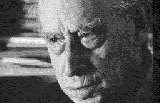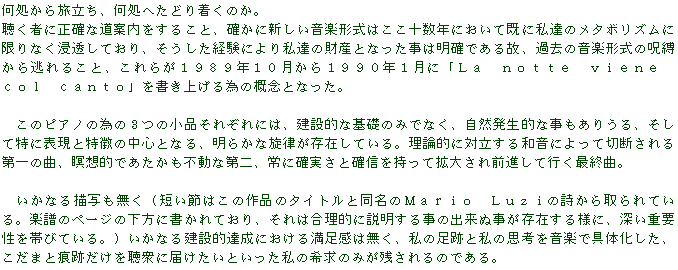2): ...la vita era sospesa tutta come questa veglia...
3): ...questa canzone non ha più parole...
 Rendere evidenti i termini del discorso, la partenza e l'arrivo, guidare nel percorso chi ascolta; tendere quindi alla chiarezza, fuggendo ibridi ritorni al passato, certi invece che tutto quanto gli ultimi decenni ci hanno consegnato sia un patrimonio di esperienze ormai metabolizzato ed ineliminabile: queste sono state le idee-guida nello scrivere, fra l'ottobre 1989 ed il gennaio 1990, La notte viene col canto.
Rendere evidenti i termini del discorso, la partenza e l'arrivo, guidare nel percorso chi ascolta; tendere quindi alla chiarezza, fuggendo ibridi ritorni al passato, certi invece che tutto quanto gli ultimi decenni ci hanno consegnato sia un patrimonio di esperienze ormai metabolizzato ed ineliminabile: queste sono state le idee-guida nello scrivere, fra l'ottobre 1989 ed il gennaio 1990, La notte viene col canto.E' quindi una evidente linea melodica, in ciascuno di questi tre brevi pezzi per pianoforte, a porsi non solo come fondamento costruttivo del tutto, ma a divenire, in primo luogo e apertamente, anche fulcro espressivo e caratterizzante, interrotto ed intersecato da accordi dialetticamente ostili nel primo brano, bloccato in fissità contemplative nel secondo o in progressivo ampliamento, come sempre più sicuro e convinto, nell'ultimo pezzo.
Assente ogni descrittivismo (i frammenti tratti dalla omonima poesia di Mario Luzi che dà il titolo al lavoro, posti in calce alla partitura, hanno risonanze ben più profonde, affinità poste in regioni estranee alla razionalizzazione), assente ogni compiacimento strutturale fine a sè stesso, rimane l'esigenza di consegnare a chi ascolta gli echi e le tracce, concretizzatesi nella pagina di musica, dei propri passi e dei propri pensieri.
 La notte viene col canto consists of three separate pieces; each of them finds its starting point in a clear melodic line: it becomes both the element on which all the elaborations are founded and the expressive center of every piece.
In the first of them - the most articulate and complex - this line is surrounded and sometimes hidden expecially by violent chords and by their resonances, in an anxious and hostile atmosphere.
La notte viene col canto consists of three separate pieces; each of them finds its starting point in a clear melodic line: it becomes both the element on which all the elaborations are founded and the expressive center of every piece.
In the first of them - the most articulate and complex - this line is surrounded and sometimes hidden expecially by violent chords and by their resonances, in an anxious and hostile atmosphere.A quiet, nocturnal contemplation is the characteristic feature of the second piece; the third one presents a line that grows every time that it is repeated and leads to a static epilogue.
Even if short fragments of Italian poet Mario Luzi are written at the end of every piece (... hidden at a turn of age waiting for your hour... - ...all the life was suspended like this vigil... - ...this song has no more words...), there is no descriptive intention: resonances are deeper, outside of any musical rationalization. With no empty structural satisfaction, what is left is only an echo and trace of one's own steps and thoughts, that have taken shape on a musical page.
